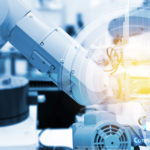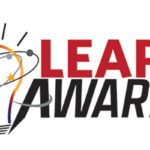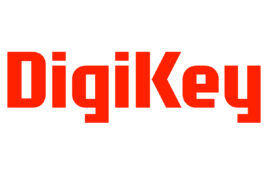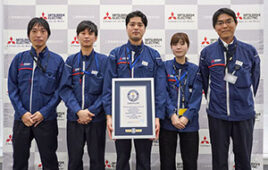The Mars helicopter team is awarded the Collier Trophy for being the first aircraft to achieve powered, controlled flight on another planet. NASA’s Ingenuity helicopter flies with electric motors from the Swiss company maxon, a provider of precision drives. This prestigious award was presented on June 9th in Washington DC by the National Aeronautic Association (NAA)

From left to right: Matt Keennon, Florbela Costa (maxon), Sara Langberg, Ben Pipenberg, AeroVironment, Inc.
NASA’s Mars helicopter is the first controlled aircraft in history to be used on a planet other than Earth, laying the way for future airborne exploratory missions to other planets. The pioneer project has been developed by a team of engineers, including from NASA’s Jet Propulsion Laboratory (JPL), AeroVironment and maxon. The more than a century old Robert J. Collier Trophy is awarded by the U.S. National Aeronautic Association (NAA) each year marking major achievements in the timeline of aviation, including one of the Wright brothers in the 1910s and the Apollo missions to the moon in the late 1960s.
For maxon, the Mars expedition is a special highlight in its space sector experience. Both the Perseverance rover as well as the Ingenuity helicopter are equipped with maxon motors. “It wasn’t easy to meet the incredibly strict requirements of the mission. These successful flights exceeded all our expectations”, says maxon CEO Eugen Elmiger.
The helicopter is manufactured by AeroVironment, an unmanned air vehicle (UAV) specialist, under contract from JPL. maxon’s “SpaceLab” engineers have been working closely with their counterparts at AeroVironment. Six precision micro motors (DCX10 S) with a diameter of 10 mm are installed to move the swashplates. Swashplates are found on all helicopters and are made to adjust the angle of the rotor blades and thereby to control the helicopter’s flightpath.
It took intense development work for NASA’s Mars missions. For the small helicopter to fly, it takes an incredible engineering effort. The thin air on Mars is comparable to the conditions on Earth at an altitude of 30 kilometers. This means that the helicopter must be extremely light (1.8 kg) and can only carry small batteries that must be highly energy-efficient, a requirement that also applies to maxon’s DC motors.
“We’re very proud to have joined the team of AeroVironment and JPL at the Collier Trophy award ceremony and share this great honor”, says Florbela Costa, maxon’s SpaceLab project manager. The SpaceLab is an organization within maxon that specializes in developing high risk new technologies for space missions, as well as supporting the growing commercial space market with high reliability actuators that are suitable for the harsh space environment.
You may also like:
Filed Under: Aerospace + defense, Awards • acquisitions










